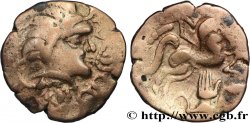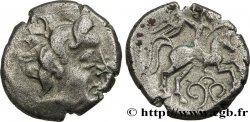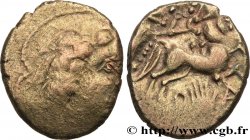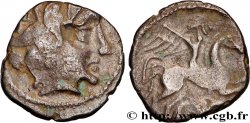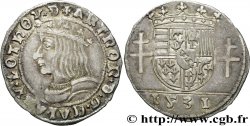正面
正面的文字 ANÉPIGRAPHE.
正面的说明书 Tête à droite, les cheveux épars avec de grosses mèches.
背面
背面的文字 ANÉPIGRAPHE.
背面的说明书 Cavalier ailé galopant à droite (sous le cheval, un fleuron orné d'un globule).
评论
历史细节
PICTONES (Area of Poitiers)
(2nd - 1st century BC)
The Pictons were a people of the Celtic settled in the current Poitou to whom they gave their name. Their capital was Lemonum (origin: lemo or limo = elm), at the confluence of the Clain and the Boivre, on a fortified oppidum, today Poitiers. They were a people who had good sailors. Their name comes from the fact that they painted their faces, Pictavi, name given by Caesar. He enlisted five thousand Pictons as auxiliaries in 56 BC. -VS. , in order to build boats for his campaign against the Veneti. This fleet was also used for the Brittany expedition in 55 BC.. -VS. In 52 BC. -VS. , they provided eight thousand men to the relief army to go and deliver Alesia, besieged by Caesar. Among the Picton chiefs mentioned several times, we find Atectorix and Duratios. Atectorix seems to have been a Gallic chief or notable who was to create an "ala I Gallorum Atectorigiana" at the end of Caesar's stay in Gaul (50 BC).. -VS. ) or just after leaving for Italy. The troop thus created constituted a unit of auxiliaries, soldiers who served in the Roman armies but were not integrated into the legions.. As for Duratios, a Gallic chief, he was one of the kings of the Pictons. Faithful ally of the Romans, he was besieged in 51 BC. -VS. by Dumnacus, Chief of the Andes, in Lemonum (Poitiers). He was delivered by Caius Fabius. Later, Caesar gave him the right of Roman citizenship. It is mentioned by Hirtius. Caesar (BG. III, 11; VII, 4 and 75; VIII, 26 and 27). Strabo (G. IV, 2, 1). Kruta: 68, 365-366.








 对产品描述纠错
对产品描述纠错 打印
打印 分享我的选择
分享我的选择 提问
提问 Consign / sell
Consign / sell
 产品介绍
产品介绍
